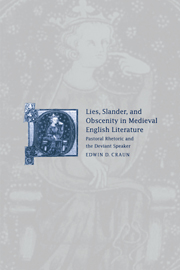 Lies, Slander and Obscenity in Medieval English Literature
Lies, Slander and Obscenity in Medieval English Literature Book contents
- Frontmatter
- Contents
- Acknowledgments
- Note on quotations and translations
- Standard abbreviations
- Introduction
- 1 The pastoral movement and deviant speech: major texts
- 2 The lies of the Fall, the tongues of Pentecost: typing and converting the deviant speaker
- 3 Exemplifying deviant speech: murmur in Patience
- 4 Confessing the deviant speaker: verbal deception in the Confessio Amantis
- 5 Reforming deviant social practices: turpiloquium/scurrilitas in the B Version of Piers Plowman
- 6 Restraining the deviant speaker: Chaucer's Manciple and Parson
- Bibliography
- Index
- CAMBRIDGE STUDIES IN MEDIEVAL LITERATURE
5 - Reforming deviant social practices: turpiloquium/scurrilitas in the B Version of Piers Plowman
Published online by Cambridge University Press: 31 October 2009
- Frontmatter
- Contents
- Acknowledgments
- Note on quotations and translations
- Standard abbreviations
- Introduction
- 1 The pastoral movement and deviant speech: major texts
- 2 The lies of the Fall, the tongues of Pentecost: typing and converting the deviant speaker
- 3 Exemplifying deviant speech: murmur in Patience
- 4 Confessing the deviant speaker: verbal deception in the Confessio Amantis
- 5 Reforming deviant social practices: turpiloquium/scurrilitas in the B Version of Piers Plowman
- 6 Restraining the deviant speaker: Chaucer's Manciple and Parson
- Bibliography
- Index
- CAMBRIDGE STUDIES IN MEDIEVAL LITERATURE
Summary
Piers Plowman is peopled with dozens of figures who set about catechizing and reforming the uninstructed: from Reason preaching to the whole realm at the beginning of the second dream (“wiþ a cros afore þe kyng comsede þus to techen,” B.5.12) to the friar who “gloseþ þere he shryueþ” (B.20.368) at the end of the last dream. Some of them, most notably Study rebuking Wit in passus 10 and Will addressing powerful magnates in passus 13, adopt pastoral discourse on deviant speech. Many of the folk whom they instruct or confess are given to Sins of the Tongue, especially those which assault humans (not God) with words. Backbiting, lying, chiding, false witness, murmur, sowing discord, casual swearing of oaths, idle talk, and “harlotrie” are all confessed in passus 5, under the guidance of Repentance, while Conscience fingers enough liars, flatterers, and false witnesses in the Mede episodes. Nevertheless, these speakers do not follow the exemplary mode of Genius or of the narrators of Patience and Cleanness: presenting and analyzing specific utterances in a carefully controlled way in order to modify the speech of their auditors. Furthermore, none of Will's eight dreams, with their many scenes of confession, even present a priest aiming a discourse at errant speech which is recalled and typified but not divulged, like that of Gower's lover. Not that the text refuses to voice the forbidden word: snatches of nuns' gossip, for example, surface in confession.
- Type
- Chapter
- Information
- Lies, Slander and Obscenity in Medieval English LiteraturePastoral Rhetoric and the Deviant Speaker, pp. 157 - 186Publisher: Cambridge University PressPrint publication year: 1997


